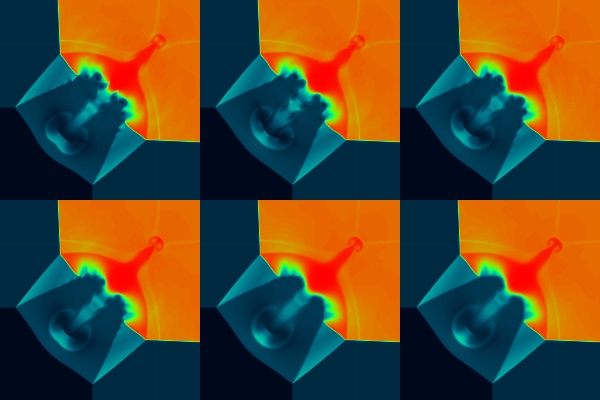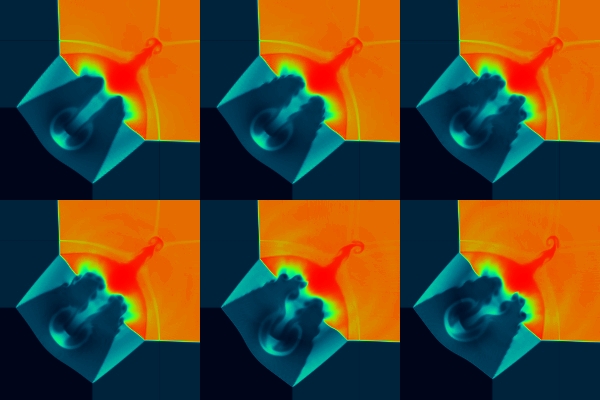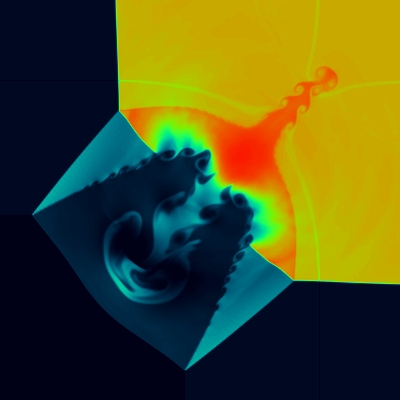
I have done some comparisons of the codes VH-1 (PPM in Lagrange + remap back to Euler grid formulation) and CLAW from CLAWPACK/AMRCLAW (unsplit 2nd order algorithm for wave propagation which, unlike the ppm, does not make x- and then y-direction sweeps, i.e. it does't use dimensional splitting.)
The test problem is a 2-d shock tube problem: two layers of high pressure gas along the two walls of a square container, and the highest pressure in the intersecting quadrant. The precise values of initial velocity are taken from CLAW applicactions page. The standard test problem is solved for t=0 to 0.8 on a square uniform grid 200x200. This is a good test of how the codes handle the shocks and the slower shearing post-shock flow, unstable toKelvin-Helmholz (K-H) instability.
This test is described in various places, originally by C.W. Schultz-Rinne
(1993, SIAM
J Sci Comput. 14, 1394-1414),
(many thanks to Tomek Plewa for this link; and here is a place where
its done with CLAW:ftp://amath.washington.edu/pub/rjl/programs/claw/doc/
- download and read note number 15.)
Results of various runs at time t=0.8 will
be shown, with panels denoted as
| a | b | c |
| d | e | f |
| panel | Courant # | cpu time | flux limiters | comments |
| a | C= 0.15 | 2180 s
(cpu=UltraSparc5) |
S S S S | S=superbee flux limiter for all 4 variables (rho, vx,vy, energy; in that order) |
| b | 0.4 | 824 s | S S S S | strangely, the central parts of the flow do not "interpolate" between panels a & c, although the timestep does. |
| c | 0.9 | 357 s | S S S S | |
| d | 0.9 | 357 s | S S S M | |
| e | 0.9 | 346 s | S M M M | |
| f | 0.9 | 343 s | M M M M | M=monotonic centered flux limiter |

These results show that
| panel | Courant # [starting value] | cpu time /#steps | dim. splitting | comments |
| a | C=0.15 [0.03] | 793 s /1548 | xyyx | K-H instab. delayed for small dt |
| b | 0.3 [0.05] | 400 s /794 | xyyx | |
| c | 0.6 [0.05] | 215 s | xyyx | 0.6 is the usual Courant # for PPM, and... |
| d | 0.6 [0.6] | 198 s | xyyx | ..it corresponds to C~0.9 in CLAW (same dt) |
| e | 0.9 [0.9] | 148 s /290 | xyyx | What happens if C=0.9 is attemped:
big wiggle because of dim. splitting! |
| f | 0.9 [0.9] | 149 s | yxxy (reversed) | --> mirror reflection of e. |

Results

This is C=0.5 (starting from 0.5), t=0.8, VH-1, at 400x400 resolution.
20 Dec. 2000
